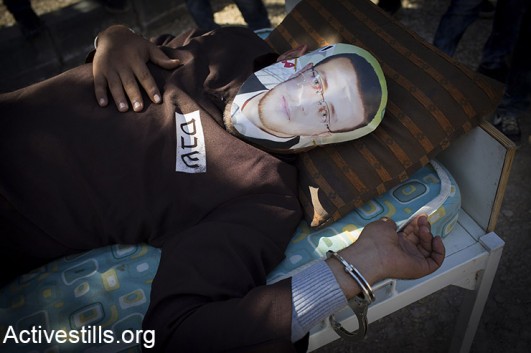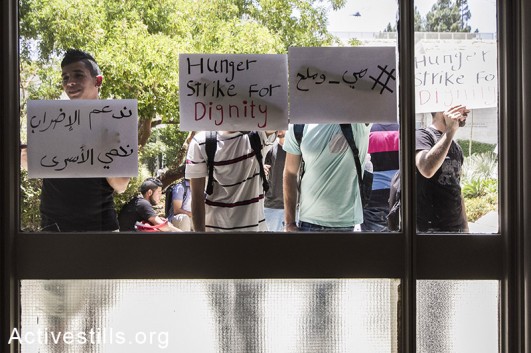Israeli security authorities view hunger striking Palestinian prisoners as political time-bombs that can undermine the occupation’s control. The High Court agrees.

In a unanimous decision by a three-justice panel, the Israeli High Court on Sunday approved the legality of the force-feeding law, which was enacted by the Knesset in July 2015.
The law allows Israeli authorities to forcibly feed hunger striking prisoners against their will if their health condition is deemed to be life-threatening, and if the measure is approved by the attorney general and a District Court judge. The procedure involves transmitting food into the patient’s body, either through the vein, through an open cut to the stomach, or more commonly through a rubber or plastic tube inserted up the patient’s nose or down the throat.
Aside from its physical and medical dangers, the practice of force-feeding poses legitimate legal and ethical dilemmas. On the one hand there is the need to respect the hunger striker’s right to protest, their personal dignity, and control over their body. On the other hand there is a need to protect the striker’s most fundamental right of all: his or her life.

But these questions are not what concern the Israeli security authorities, despite their arguments ostensibly favoring the right to life. In their eyes, a hunger striking Palestinian is a political time-bomb: the death of a prisoner might spark demonstrations, encourage other prisoners to strike, spur demands for investigations, and increase international pressure against Israel’s detention policies. The court acknowledged these worries when it wrote that hunger strikes have “implications that go beyond the personal matter of the hunger striker,” further concluding that a person who willingly endangers their own life through a strike cannot be regarded as an “ordinary patient.”
The court’s ruling went against the combined positions of human rights groups, UN experts, and both the Israel and World Medical Associations, all of which regard force-feeding as a serious breach of medical ethics, a violation of national and international laws, and a practice that amounts to torture and ill-treatment. Physicians for Human Rights-Israel, one of the petitioners in the case, stated that the court’s ruling dismissed their arguments and “relied on a minority position of Israeli ethicists and physicians that support [the law].” The Israel Medical Association also declared that it would continue to instruct doctors to disobey the law and any orders to implement it.
The ruling is not the first time that the High Court has made precarious decisions relating to Palestinian prisoners’ rights, who today number around 7,000 people including 700 administrative detainees and 340 children. In 1999, the court issued a ruling that supposedly regulated Israel’s practice of torture, but in fact provided loopholes for security agencies to use certain torture methods under the vaguely defined circumstance of “necessity.” Even in simpler cases of requesting access to higher education for Palestinian prisoners, the court rejected the petitions and sided with the state’s arguments of “security” concerns.

More recently in August 2015, the High Court gave itself an entirely new legal tool when it “suspended” the administrative detention of Mohammad Allan in order to compel him to halt his two-month hunger strike. Rather than admitting that the state had no justification for Allan’s continued detention when his health was in dire condition, the court used the “suspension” formula to give the state leeway to determine Allan’s fate at a later time. The same method was employed months later during the hunger strike of Mohammad Al-Qiq.
Without this context, it is easy to believe that the force-feeding law is a necessary measure to save lives. But the Palestinians who will be targeted by the law know that the Israeli authorities want them alive not for their own wellbeing, but to keep the occupation of Palestinians running smoothly both inside and outside the prisons — without resistance or disorder. Injecting food into prisoners’ bodies is simply another tool to achieve that goal, with the High Court ready to legitimize Israel’s oppressive control under the cover of law.


